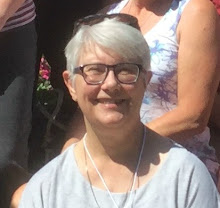Recently I seem to be spending some time helping 'new' weavers. One of the things we seem to run into is that of language.
Weaving is a centuries old craft (lately dating humans working with string back to around 40,000 years, give or take) and as such it has grown up around the globe, in every culture, every climate/environment, across the Babel of languages that humans have spoken across time and place.
When I was learning to weave, there were still distinct differences between British and American weaving vocabularies. With the growth of the internet, that seems to have reduced somewhat, with American taking the lead given the popularity of US publications and the dominance of Americans on internet chat groups. (And I don't care what Auto Correct says, die or dying are NOT weaving/dyeing terms. You might want to learn the difference and school your devices to not default to the not textile term when you mean the textile term. If *I* can do it, so can you.)
When I published Magic in the Water I made a conscious choice to use British spellings - because I'm Canadian and those were what we learned as 'our' language.
Since I am quite well read, however, I am familiar with both, just choose to use 'my' language.
Kind of like the time I was discussing textiles with a Swede and Norwegian. In Sweden, the 'rule' is that you never, ever, apply heat to linen, while in Norway, you routinely boil it as part of the cleaning process. I listened to the arguments (made lightheartedly on both sides) until finally one of them turned to me and asked what *I* did. Straight faced I said I was Canadian, I did whatever I liked.
So, I use British spellings for things which confuses the heck out of a lot of Americans. But it is my way of reminding them that people from the US are not the only people on the planet. A gentle head's up that it might be a good idea to keep an open mind. Because we can all use that from time to time.
It is also an indicator that I am not from the US, which a lot of people don't seem to realize - because I speak and write English, and since I've travelled extensively to many of the US states, *and* I have a tendency to 'pick up' accents, a lot of people don't really understand that I am from Canada.
Then you toss an archaic technology into the mix, and the specialized language required to understand it, and it can get...confusing.
So. Talking weaving.
Yesterday I advised someone to learn the language. Without the language, it will be a lot harder to learn the craft. Because learning a craft is deeply tied to the language *of* the craft. If you don't have the vocabulary, it's really hard to ask for help - or understand the answer. Which was part of the problem I was having trying to help someone. They were wanting to know what certain things meant, but they didn't understand the concepts that were being discussed. And trying to help them via the written word? Wasn't going to help much until they learned more. More words. More concepts.
I suggested that since they seemed to have a local guild that perhaps some there might give them a helping hand, but beyond that, videos.
Some people just don't learn all that well from reading something. Learning a physical process (because weaving IS a physical process, as much as it is a mental one) by at least watching someone DO the process can help clarify things.
Weaving is a huge rabbit warren. There are so many ways a learner can take to gain knowledge, that when they express a desire to learn 20 different things, it's hard to rein them in and say, start here, built slowly, take the time needed to understand.
Because weaving is not difficult, but it IS complex.
And learning the language will make the process faster and more accessible than fumbling around using words that convey no meaning appropriate to the craft.
If you do learn from words, my books are available here




No comments:
Post a Comment